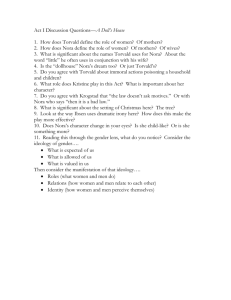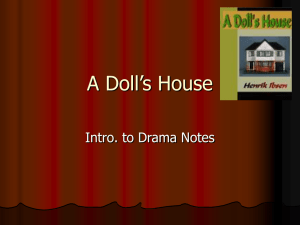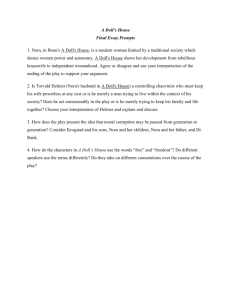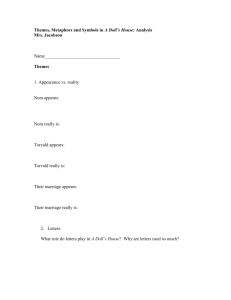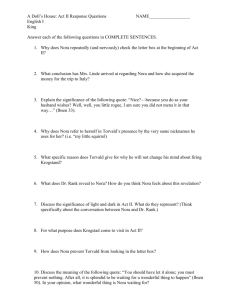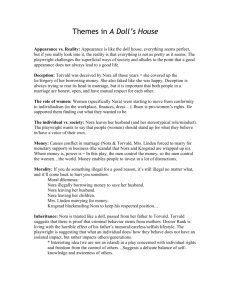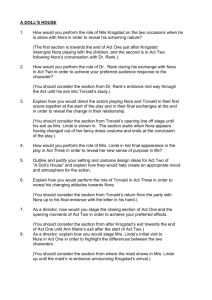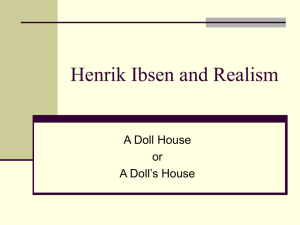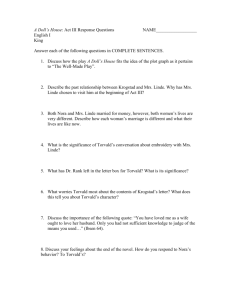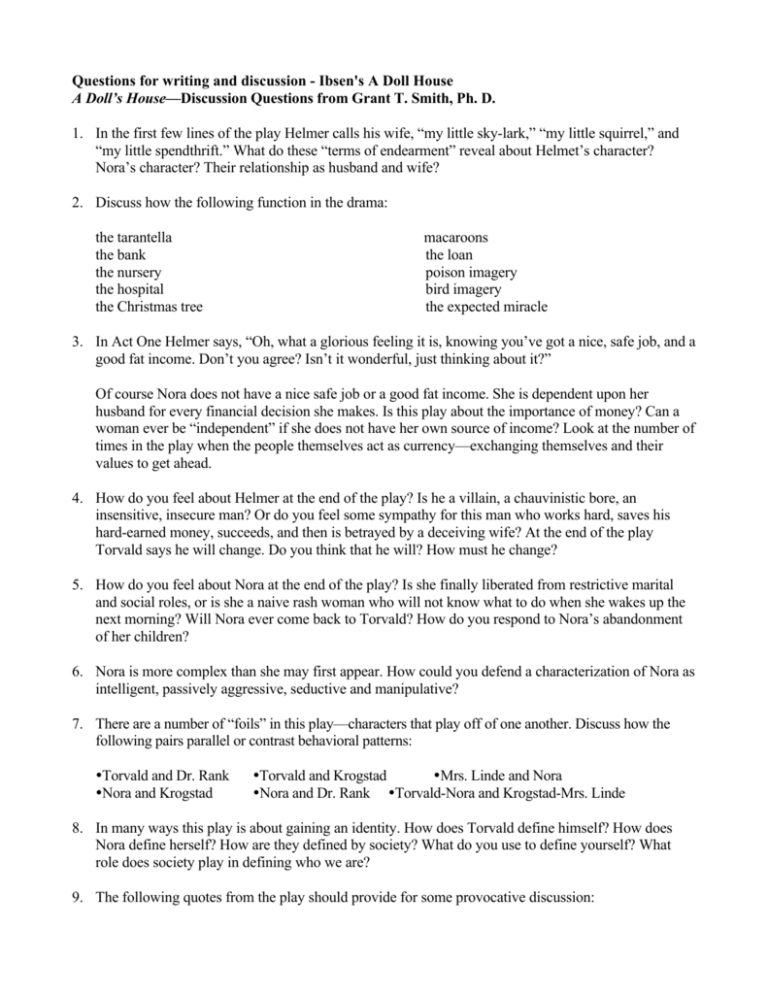
Questions for writing and discussion - Ibsen's A Doll House
A Doll’s House—Discussion Questions from Grant T. Smith, Ph. D.
1. In the first few lines of the play Helmer calls his wife, “my little sky-lark,” “my little squirrel,” and
“my little spendthrift.” What do these “terms of endearment” reveal about Helmet’s character?
Nora’s character? Their relationship as husband and wife?
2. Discuss how the following function in the drama:
the tarantella
the bank
the nursery
the hospital
the Christmas tree
macaroons
the loan
poison imagery
bird imagery
the expected miracle
3. In Act One Helmer says, “Oh, what a glorious feeling it is, knowing you’ve got a nice, safe job, and a
good fat income. Don’t you agree? Isn’t it wonderful, just thinking about it?”
Of course Nora does not have a nice safe job or a good fat income. She is dependent upon her
husband for every financial decision she makes. Is this play about the importance of money? Can a
woman ever be “independent” if she does not have her own source of income? Look at the number of
times in the play when the people themselves act as currency—exchanging themselves and their
values to get ahead.
4. How do you feel about Helmer at the end of the play? Is he a villain, a chauvinistic bore, an
insensitive, insecure man? Or do you feel some sympathy for this man who works hard, saves his
hard-earned money, succeeds, and then is betrayed by a deceiving wife? At the end of the play
Torvald says he will change. Do you think that he will? How must he change?
5. How do you feel about Nora at the end of the play? Is she finally liberated from restrictive marital
and social roles, or is she a naive rash woman who will not know what to do when she wakes up the
next morning? Will Nora ever come back to Torvald? How do you respond to Nora’s abandonment
of her children?
6. Nora is more complex than she may first appear. How could you defend a characterization of Nora as
intelligent, passively aggressive, seductive and manipulative?
7. There are a number of “foils” in this play—characters that play off of one another. Discuss how the
following pairs parallel or contrast behavioral patterns:
Torvald and Dr. Rank
Nora and Krogstad
Torvald and Krogstad
Mrs. Linde and Nora
Nora and Dr. Rank Torvald-Nora and Krogstad-Mrs. Linde
8. In many ways this play is about gaining an identity. How does Torvald define himself? How does
Nora define herself? How are they defined by society? What do you use to define yourself? What
role does society play in defining who we are?
9. The following quotes from the play should provide for some provocative discussion:
Helmer: My dear Nora, as a lawyer I know what I’m talking about. Practically all juvenile
delinquents come from homes where the mother is dishonest.
Helmer: If it ever got around that the new manager had been talked over by his wife ... As long as
the little woman gets her own stubborn way ...I Do you want me to make myself a laughing stock in
the office? ...Give people the idea that I am susceptible to any kind of outside pressure.
Nora: You shouldn’t have done that. You must let things take their course. Because really it’s a
case for rejoicing, waiting like this for the miracle.
Mrs. Linde: All my life I have worked, for as long as I can remember; that has always been my
one great joy. But now I’m completely alone in the world, and feeling horribly empty and forlorn.
There’s no pleasure in working only for yourself. Nils, give me somebody and something to work for
...A home to bring happiness into.
Nora: We have now been married eight years. Hasn’t it struck you this is the first time you and I,
man and wife, have had a serious talk together?
Nora: You two [Helmer and Nora’s father] never loved me. You only thought how nice it was to
be in love with me.
Nora: My duty to myself ...I believe that first and foremost I am an individual, just as much as
you are...
Drama Essay Topics from Teaching Composition with Literature: Writing Exercises and Ideas by
Dana Gioia
q
Spatial imagery: How do the spatial images underscore the isolation of members of the family
and contribute to the theme of the failure of communication between spouses? Are the spatial
images of enclosure in any way contrasted with images of freedom?
•
•
•
•
•
•
Boxes
Doors
Barriers that divide the characters
Windows
Letters
Letterbox
q
Decide what the moment of recognition and reversal is in A Doll’s House. What does Nora
recognize (the miracle) and how is her situation at the end of the play reversed from the
beginning? Show how the action leads up to this moment (or these separate moments if they are
not the same) and explain why the denouement [look up terms you are unfamiliar with] is then
inevitable. Use specific quotes from the play.
q
Many people were outraged that Nora would leave her husband and children at the end of A
Doll’s House. In fact, some early versions of the play have her going into the children’s room at
the last minute and deciding to stay. Which ending do you think is the more effective one, from a
dramatic/literary standpoint, and why? Be sure to refer to the main themes of the play and to keep
in mind Nora’s and Torvald’s characters.
q
In what ways does A Doll’s House seem to apply to life today? Is it in any way dated? A period
piece? Is the play valuable only as it depicts life in the nineteenth century in Norway, or does it
still tell us something about life today? Could there be a Nora or a Torvald in the United States
today?
q
Ibsen claimed that A Doll’s House was not about women’s rights but rather about human rights.
Is there any difference between the two? Is there a feminine self and a masculine self or just a
human self? What about morality? Sexuality? Epistemology? Can you enter into the debate
between “sameness” and “difference” using A Doll’s House as your basis for discussion?
A Doll’s House—Additional Questions (some overlap with previous ones)
1. The play ends with Nora’s famous rebellion against the husband and the Victorian society that
have reduced her to a plaything. But throughout the play we see Nora rebelling in symbolic ways:
things she says, neurotic habits of behavior, defiances timid to frantic. Discuss at least three ways
Nora rebels against her world before her final departure.
2. A major symbolic pattern in the play is Nora and Torvald’s incessant need to hide, suggesting on a
larger level the Victorian middle class’s wish to hide from the ugliness and the harsh realities or
capitalistic society. Examine the varieties of hiding in the play (evasion, disguise, lies) and discuss
how and why the Helmers try to maintain their “charmed life.”
3. Discuss Krogstand, Mrs. Linde, and Dr. Rank as foil characters to Torvald and Nora. What does
each character teach the Helmers about their doll house?
4. Michael Meyer, in his biography Henrik Ibsen, says that the play is not so much about women’s
rights as about “the need of every individual to find out the kind of person he or she really is, and
to strive to become that person.” Support this interpretation.
1.
2.
3.
4.
Is it essential that the main character be a woman in this play?
In what ways does Ibsen give external symbols of internal qualities in his characters?
Is Nora a victim or does she bring her trouble on herself?
What social message might Ibsen support through this play?
Give specific references to the text in your responses.
1. Who is responsible for the "doll house" condition of the marriage? To what extent is Nora a victim?
2. Rank the characters in order of virtue, explaining which moral quality you think each person
embodies and why.
3. How does the play present the idea that moral corruption may be passed from generation to
generation. Consider Krogstad and his sons, Nora and her children, Nora and her father, and Dr. Rank.
4. Is A Dollhouse a comedy, a tragedy, or both? Explain.
5. Which characters change in the course of the play? Consider one dynamic character and examine the
causes and effects of the change. Also consider how characters act as foils.
6. How does the play criticize society's conventions, such as the patriarchal society and laws
concerning loans.
7. Who is the play's antagonist? Explain.
8. Argue for or against Nora's decision at the end of the play.
9. Recreate a chance meeting between Nora and Torvald five years after the play's end.
10. You are the play's director. Explain how you would coach an actor portraying one of the characters
in a specific scene. Identify the scene and pages. You may also respond as the actor describing how
(s)he will portray the character.
In seeing the play as tragedy consider how the play may portray the four elements of this genre:
•
•
•
•
an act of shame or horror
consequent intense suffering
an increase in knowledge or awareness
a reaffirmation of life's value
1. Explain how language throughout the play reveals the relationship between Nora and Torvald, and
the ways this relationship shifts between the beginning and the end of the play.
2. Explain the significance of the title of the play.
3. Explain the relationship between Nora's dance and the theme of the play.
4. Explain why Nora's change of dress may be considered symbolic.
5. Identify the climax of the play. Explain your answer.
6. Does the play contain a recognition scene? If so, is Nora, in any sense, a tragic heroine?
Background and Criticism
Henrik Ibsen's plays anticipate major developments of the twentieth and twenty-first centuries:
•
•
•
he individual's feelings of alienation and actual alienation from society,
the pressures by which society insures conformity to its values and suppresses individuality,
the barriers which modern life sets up against living heroically.
A Doll´s House (1879) was a social drama, which caused a sensation and toured Europe and America.
A Doll’s House is about a woman who refuses to obey her husband and walks out from her apparently
perfect marriage, her life in the "doll's house."
At the turn-of-the-century physicians used Nora, whose mood changes from joy to depression in short
cycles of time, as an example of "female hysteria."
Later, critic, Havelock Ellis, inspired by Nora's character, saw in her "the promise of a new social
order."
“Is A Doll House a Feminist Text?”
(Joan Templeton 1641-1641)
Templeton’s critique uses strident quotations and a sarcastic tone to imply that Ibsen has been “saved
from feminism” by many contemporary male critics. Templeton, in truth, calls for feminist a reexamination of the character of Nora.
– What does a feminist reading reveal about the character of Nora whose life was circumscribed by a
patriarchal society?
– Could Ibsen have written a play with this theme about a man? Who might have been controlling
him?
“A Psychoanalytic Reading of Nora”
(Carol Strongin Tufts 1641-1641)
Tufts asserts an alternative character analysis of Nora. Rather than viewing Nora as a victim, Tufts
frames the psychoanalytic argument of Nora as narcissistic: Can you find textual evidence that reveals:
•
•
•
•
•
Grandiose sense of self-importance and uniqueness – exaggerates achievements and talents,
focuses on how special one’s problems are.
Preoccupation with fantasies of unlimited success, power, brilliance, beauty, or ideal love.
Exhibitionistic: requires constant attention and admiration.
Responds to criticism, indifference of others, or defeat with either cool indifference, or with
marked feelings of rage, inferiority, shame, humiliation, or emptiness.
Relationship dysfunctions: Lack of empathy, Entitlement, Interpersonal exploitiveness or
vacillating between the extremes of over-idealization and devaluation.
Study Guide to
Henrik Ibsen's A Doll House:
Ibsen's characterization of Torvald
What does Torvald inadvertently expose about himself, through his behavior in the two scenes in
which he reponds to the successive letters from Krogstad? (What, specifically, reveals him to be
irrational, selfish, cowardly, or unfair?)
We might start by specifying what exactly it is that Torvald comes down on Nora for about her
character.
•
He rails at her for being an unfit mother on account of her intrinsically lying nature. Earlier in
the action (just before the end of Act I) he has complained, in connction with the odious (to
him) Krogstad, that such "moral disease," once brought into a household, corrupts the children,
and breeds social delinquents.
From this we have a number of interesting paths we could take. What ironies surface when we
consider the answers to questions like the following? (In terms of Torval's character this is equivalent
to asking: what embarrassing contradictions does Torvald involve himself in without taking proper
notice of?)
(1) In castigating Nora for having committed a lie (by forging her father's signature on the promissory
notice required as collateral on the loan she took out to enable Torvald's medically necessary R&R, in
Italy), what do we understand that he is really upset about?
What details in the first letter already point to this?
How is this confirmed in his response to Krogstad's second letter?
(2) In his tirade on receiving the first letter, what does he inadvertaently reveal that he has done, before
he and Nora were married?
[Note that whether you are able to pick up on this can depend on which translation of the play you are
relying on. See the comparisons provided in the Study Guide on "Torvald's tirade." For the purposes
of this question, obviously, you will want to rely on the translations most damaging to Torvald.]
Did he have any comparable excuse in personal naïveté about the seriousness of what he was doing
when he did it? (Explain.)
What does he represent as his motive in doing this? Are we to take this at face value? And even if we
did, what strikes us as ironic about his complaining that "this is how I am repayed for [doing what I did
for you]?
(3) What kind of life does he insist on imposing on Nora and himself, after taking stock of the first
letter?
Similarly (see how?), how does his righteous indignation about the character weakness of liars square
with his declaration that he has no alternative but to give in to any blackmailing demands that Krogstad
might make?
Study Guide to Ibsen's A Doll House -Torvald's tirade in the various English translations
A key passage in Torvald Helmer’s reproach of his wife Nora has been quite differently treated in the
various translations of the play into English. Pay special attention to the phrase highlighted in bold.
•
•
•
Which alternatives indicate to us that we are to think of Torvald as inadvertantly revealing that
he has betrayed a position of public trust by filing a false report, attested by oath, of his
examination of whether Nora’s father had abused his own position of public trust by some act
of personal dishonesty?
Which alternatives prompt invite us to suppose that Torvald is reproaching himself only for
having overlooked the poor moral character of a potential father-in-law in choosing a mate,
who should be assumed to be subject, by the laws of heredity, to the same moral weaknesses?
How does how we understand what Torvald is referring to here affect how we understand what
he means by "for your sake" in the next sentence?
from the translation by William Archer (1906):
I ought to have known how it would be. I ought to have foreseen it. All your father’s want of
principle — be silent! — all your father’s want of principle you have inherited — no religion, no
morality, no sense of duty. How I am punished for screening him! I did it for your sake; and you
reward me like this.
from the translation by R. Farquarson Sharp (London: J.M. Dent & Sons, 1910):
I ought to have suspected that something of the sort would happen. I ought to have foreseen it. All your
father’s want of principle — be silent! — all your father’s want of principle has coume out in you. No
religion, no morality, no sense of duty. How I am punished for having winked at what he did! I did it
for your sake, and this is how you repay me.
from the translation by Eva LeGaulienne (Modern Library edition, 1951):
I maight have known what to expect. I should have foreseen it. You’ve inherited all your father’s lack
of principle — be silent! — all of your father’s lack of principle. I say! — no religion, no moral code,
no sense of duty. This is my punishment for shielding him! I did it for your sake; and this is my
reward!
from the translation by James McFarlane (Oxford University Press, 1961)
I should have realized something like this would happen. I should have seen it coming. All your
father’s irresponsible ways. . . . Quiet! All your father’s irresponsible ways are coming out in you. No
religion, no morals, no sense of duty. . . Oh, this is my punishment for turning a blind eye to him. It
was for your sake I did it, and this is what I get for it.
from the translation by Rolf Fjelde (Sutton Signet / New American Library, 1965):
I should have expected something of the kind. I should have known. All your father’s flimsy values —
Be Still! All your father’s flimsy values have come out in you. No religion, no morals, no sense of
duty — Oh, how I’m punished for letting him off! I did it for your sake, and you repay me like this.
from the translation by Peter Watts (Penguin Books, 1965):
I might have known that something of this sort would happen — I should have foreseen it. All your
father’s shiftless character — be quiet! — all your father’s shiftless character has come out in you. No
religion, no morality, no sense of duty . . . So this is what I get for condoning his fault! I did it for
your sake, and this is how you repay me!
from the translation by Michael Meyer (London: Rupert Hart-Davis, 1965):
I ought to have guessed something of this sort would happen. I should have foreseen it. All your
father’s recklessness and instability — be quiet! — I repeat, all your father’s recklessness and
instability has has handed on to you! No religion, no morals, no sense of duty! Oh, how I have been
punished for closing my eyes to his faults! And now you reward me like this.
from the translation by Frank McGuiness (New York: Stage & Screen, 1997):
I should have known something like this would happen. Your father was a reckless man, and you are
his reckless daughter — don’t interrupt. No religion, no morals, no sense of duty. I’m being punished
for closing my eyes to his faults. I did it for your sake. This is how you repay me.
What difference does it make whether we think of Torvald in this instant as castigating himself for
having overlooked the weak moral character of Nora's father or for having collaborated in the cover-up
of some illegalities in her father's conduct as a public official?
Framework contents copyright © 2000 by Lyman A. Baker. Permission is granted for noncommercial educational use; all other rights reserved.

